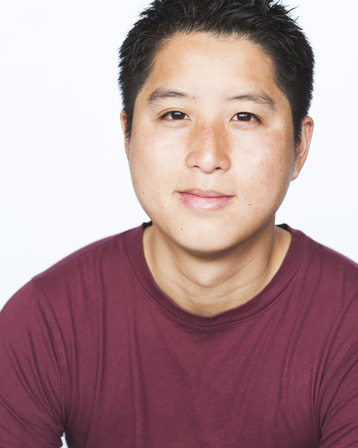Introduction
|
Hello, my name is Russell Fung, and I'm a screenwriter and entertainment professional residing in Los Angeles, CA. I hold a BA degree in Communication from UC San Diego. Included in this portfolio is a summation of my work towards receiving the TESOL (Teaching English to Speakers of Other Languages) Certificate from UCLA Extension. This is where I developed teaching methods based on my experience working in the entertainment industry. I'm currently seeking opportunities to teach ESL students of various levels. I also specialize in serving students interested in learning English with an emphasis in navigating the worlds of theater, radio, film, and television. In my previous occupation, I helped write the screenplay for Gold Valley Films’ animated feature, Cinderella and the Secret Prince. This experience brought me to work in Guangzhou, China, where I wrote English dialogue and infused western humor into the company’s feature animation projects. This was where my interest sparked for teaching English. My passion is to help people learn important English language skills so that they can advocate for themselves, bridge cultures, and build empathy in a more connected world. |
Professional Teaching Goals
Four professional goals that I hope to accomplish in the next three years:
1. Acquire a substitute teaching credential and teach at least one class in between TV production jobs.
2. Produce high quality video lessons to post on YouTube and add to my portfolio.
3. Three letters of recommendation to apply to a TESOL Masters Program. Most likely Cal State LA or San Jose State.
4. Receive a masters degree in teaching.
1. Acquire a substitute teaching credential and teach at least one class in between TV production jobs.
2. Produce high quality video lessons to post on YouTube and add to my portfolio.
3. Three letters of recommendation to apply to a TESOL Masters Program. Most likely Cal State LA or San Jose State.
4. Receive a masters degree in teaching.
Teaching Philosophy
I come from an entertainment industry background where movies and television have a significant influence in people’s lives. This industry examines/shapes/creates culture, art, and commerce. It’s no surprise that people from all over the world choose to come to California to pursue opportunity. There’s one opportunity that stands out in my mind: can television and film experience be used to advance education? In other words, can students use film and TV to learn English? The answer is an absolute yes.
According to the New York Times article, “How ‘Friends’ Helps People Around the World Learn English,” people who aren’t native English speakers appear to enjoy learning the language with help from the hit sitcom. The article lists several anecdotes of teachers using a show to teach English. For example, the famous Korean pop group: BTS. One of the members learned English by watching episodes of F-R-I-E-N-D-S. You know, the one where Ross and Rachel were on a break. This is one of many stories I’ve heard where American sitcoms taught people how to speak English. It was quite unbelievable whenever I heard stories like this. However, I found a breakthrough when I tried to learn other languages such as French, Mandarin, Japanese, and Korean. I picked up the language faster when I watched television shows and movies from those regions.
It makes absolutely more sense for example, to learn French from a movie that has the following elements:
- Directed by a French director
- Set in France
- Actors and characters speak in French
- Historical and cultural context is French.
Therefore, when it comes to teaching in a classroom, I believe exhibiting media content is one part of the process. The second part is putting what is watched into practice. In order to do that, I’d integrate the lesson portion of the class activity: vocabulary, sentence structure, and pronunciation. Once students have context from watching a scene, they can have a frame of reference for their lessons. The third and final part of the lesson, is application. Apply the lesson by practicing dialogue with other students.
Ives, M. (2021, May 29). How ʻFriendsʼ Helps People Around the World Learn
English. The New York Times. https://www.nytimes.com/2021/05/29/arts/television/friends-reunion-english.html
According to the New York Times article, “How ‘Friends’ Helps People Around the World Learn English,” people who aren’t native English speakers appear to enjoy learning the language with help from the hit sitcom. The article lists several anecdotes of teachers using a show to teach English. For example, the famous Korean pop group: BTS. One of the members learned English by watching episodes of F-R-I-E-N-D-S. You know, the one where Ross and Rachel were on a break. This is one of many stories I’ve heard where American sitcoms taught people how to speak English. It was quite unbelievable whenever I heard stories like this. However, I found a breakthrough when I tried to learn other languages such as French, Mandarin, Japanese, and Korean. I picked up the language faster when I watched television shows and movies from those regions.
It makes absolutely more sense for example, to learn French from a movie that has the following elements:
- Directed by a French director
- Set in France
- Actors and characters speak in French
- Historical and cultural context is French.
Therefore, when it comes to teaching in a classroom, I believe exhibiting media content is one part of the process. The second part is putting what is watched into practice. In order to do that, I’d integrate the lesson portion of the class activity: vocabulary, sentence structure, and pronunciation. Once students have context from watching a scene, they can have a frame of reference for their lessons. The third and final part of the lesson, is application. Apply the lesson by practicing dialogue with other students.
Ives, M. (2021, May 29). How ʻFriendsʼ Helps People Around the World Learn
English. The New York Times. https://www.nytimes.com/2021/05/29/arts/television/friends-reunion-english.html

